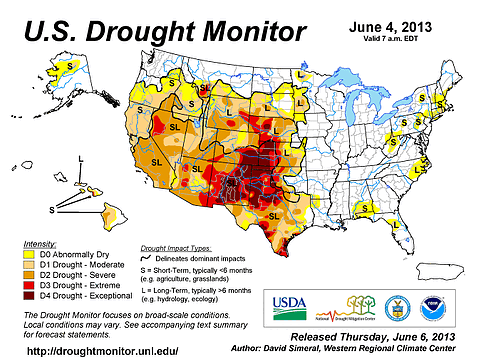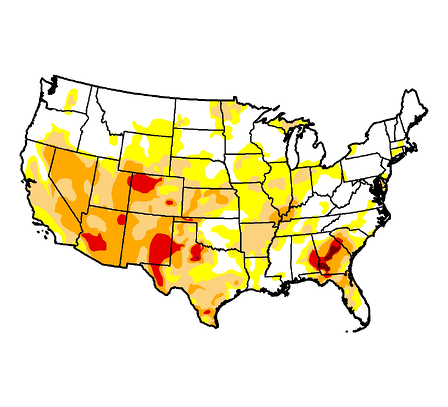Typically, discussions about drought conditions center on the impact a lack of rain has on agriculture; however, water and drought conditions have a significant impact on the energy sector as water is used for cooling purposes in power plants and the lack of water can negatively impact generation, creating stress on the electric grid during periods of high demand. While the impact of water on power plant output has been understood for years, the explosion in fracking has added another pressure point on the water supply.
The following map shows the areas of the U.S. where there are drought conditions according to the U.S. Drought Monitor (http://droughtmonitor.unl.edu/monitor.html). With a significant amount of fracking activity occurring in West and South Texas as well as and parts of Pennsylvania, the availability of water could significantly impact future fracking activity and hence the available supply of natural gas.

Fracking and Water
The process of fracking consumes copious amounts of water as it is used to fracture rock formations that contain natural gas deposits, which were previously inaccessible. Fracking involves pumping a chemical mixture suspended in water at high pressure, to crack open a rock formation containing natural gas and/or oil. Fracking a well can use several million gallons of water over days or weeks. A report issued by the University of Texas in 2012 found that water consumption for fracking increased by 125% from 2008-2011, consuming an estimated 81,500 acre feet per year, or roughly 75% of the annual consumption of the City of Austin, TX. However, approximately 25% of the total water used in fracking now consists of either recycled or brackish water (water that has not been completely treated and which is not fit for human consumption), suggesting that the industry is aware of environmental sensitivities related to the increase in fracking.
How Does This Impact The Natural Gas Industry?
The map below shows the status of drought according to the U.S. Drought Monitor as of June 12, 2012.

By comparison to the map above, drought conditions have intensified in the Eagle Ford (South Texas), the Permian Basin (West Texas) and the Marcellus (Pennsylvania) shale formations. In fact, in April of this year, the Susquehanna River Basin Commission suspended water withdrawal permits for fracking operations due to concerns about water flow. While this suspension did not stop the ability of producers to obtain water from other resources, it illustrates the delicate balance between water consumption for fracking and for other uses.
Overall, natural gas producers will likely need to continue to look at other options, including “water- free fracking”. In this process, water is replaced with other liquids, potentially including propane and potentially nitrogen and carbon dioxide. While the initial costs for this method are higher than contemporary approaches, over the long term this technology certainly has significant opportunity. Based on some initial work done by a company known as GasFrac, which uses propane instead of water to frack its wells, propane fracked wells actually experience lower blockage rates than wells fracked with water. Gas-Frac technology is still at an early stage, and can potentially have higher initial costs than conventional fracking.
Conclusions
With the growth of fracking as a method for exploring and producing natural gas, concerns are increasing about the amount of water consumed during this process. With drought conditions worsening in areas where there are significant fracking opportunities, such as Pennsylvania and Texas, there could be increasing concerns about the water consumed during this process. While the industry appears to be taking steps to alleviate the pressure that it puts on water supplies, such as using recycled and brackish water, it is not difficult to envision a future where fracking competes with water supply from communities. One promising technology is the use of non-water liquids, such as propane and potentially nitrogen as substitutes for water. As the industry continues to evolve, this trend away from water based fracking will be worth tracking.



